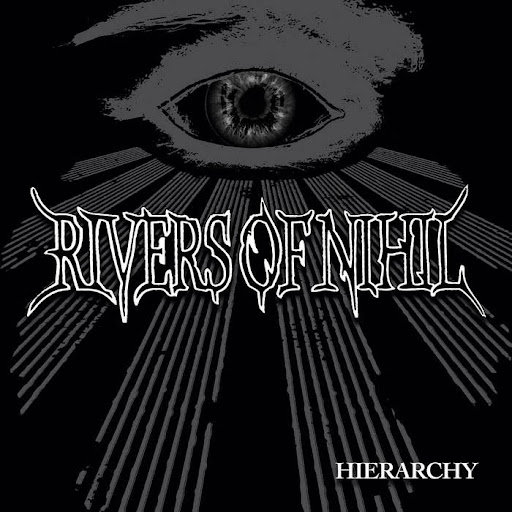Hierarchy - Rivers of Nihil

It isn’t new, but it’s new to me.
Imagine my excitement upon seeing a new Rivers of Nihil release, and the subsequent disappointment when I realize it isn’t new, and just a re-release of their first EP. If you can’t, I was fairly disappointed. Rivers of Nihil is a progressive/technical death metal band from Reading Pennsylvania, but I think I can safely drop the “progressive” portion of their sound with this old EP. Hierarchy is a straightforward tech death release, with elements of djent due to their (to some) absurd tuning of Drop F#, G# standard if they’re feeling particularly light that day. The band was, at that time, made up of Jake Dieffenbach on vocals, Jon Kunz on rhythm guitar, Brody Uttley on lead guitar, Adam Biggs on bass guitar, and Ron Nelson on drums. Today, only Biggs and Uttley remain.
The EP opens with “Chambers of Civility”, and we’re given a familiar, yet foreign sound when ex-vocalist Jake Dieffenbach lets out his first bellow. It’s undeniably him, but he sits in this half-swallowed bark that’s about as intelligible as the rest of the album. While their first album, which shares a track with Hierarchy sounds crisp and alive, Hierarchy unfortunately sounds a bit generic. Part of why I haven’t spoken of the song itself is because there isn’t much to speak of until about a minute and a half in, when there’s a brief riff with odd timings and ringing, dissonant higher strings. I think this song takes a while to get going, but the midpoint where it slows down and a young Adam Biggs shows his chops serves as a transition point sonically. It ends with gnarly chugs and a nice solo, though the winding structure of the songs feels odd when so used to even songs like “Rain Eater” with such a catchy chorus.
Following is “Human Adaptation”, a song that has shared custody between Hierarchy and The Conscious Seed of Light. If the more popular version of the song is a man clawing from the earth frantically, the original version is that same man scrounging through the mud ferally. Both have merits, but I think the mixing and Dieffenbach’s more usual delivery serve RoN’s overall sound better. There are periods where that familiar voice comes through, but I find his performance on Hierarchy a little disappointing, saved only by the knowledge that this is where one of my favorite vocals started. On the topic of vocals, Biggs notably doesn’t use his high screams, something that makes his and Dieffenbach’s synched screams sound muddy compared to the dual attack of the more recent variant of this track.
“Ultimate Sentience” is a much more appealing track, with almost brief elements of black metal in the giant chords played periodically between the tremolo playing and snarls. There is a brief digitization of Dieffenbach’s screams that I wish was played with more, but it’s made up for by a nasty riff at the midpoint that changes into those same blackened, screaming chords beneath Ron Nelson’s blast beats. The repeated forays into blackened metallic textures reward us with these brittle screams that are nearly lost in the wave of distortion, before Adam Biggs finally gives a bass lick before the vocals dip into some slam metal gurgles, giving an almost primal side to the guys who made Where Owls Know My Name. While the previous two tracks didn’t impress, “Ultimate Sentience” is infuriating for how it should’ve taken the place of “Human Adaptation”.
The EP closes with “Post-Mortem Prostitution”, a song title I’d expect from a more vulgar band but find interesting nonetheless. This follows its predecessor’s footsteps in being genuinely phenomenal, and it again makes me salty that these final two songs weren’t included on any of their more official work. Nasty guitars are intercut with bass licks, and the band has found my weakness on this song: staccato guitars with continuous drums. Overall, this is far and away the best song here, even if it’s less diverse than the one before it. The melodic solo truly seals the deal, being something that we may hear on even Monarchy, which I think is their best material before they became more progressive death than tech death.
The EP starts weak, but gets really good and makes me question why they picked “Human Adaptation” over the final two pieces of the four part death metal puzzle. I’d rate the EP as a whole as mediocre, but the second half is a genuine 8/10, minimum.